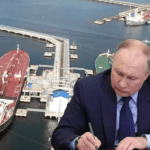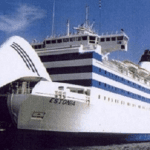Vehicles with Russian license plates will no longer be allowed entry into Estonia.
The Estonian minister of foreign affairs Margus Tsahkna, announced the decision to prohibit entry for all automobiles with Russian registrations.
The Minister Tsahkna also declared that Russians are not welcome in Estonia and emphasised that it is the proper course of action to prohibit vehicles with Russian license plates from entering the nation.
The ban, which officially became effective today, September 13, will apply not only to private vehicles but also to company transport operations, the authorities have revealed.
Reacting, the Minister of Interior of Estonia, Lauri Laanemets, said that the country’s decision follows the clarifications made by the EU Commission on sanctions compliance.
Moreover, Minister Laanemets said that Lithuania and Latvia could also soon impose an entry ban on Russian vehicles.
The Estonian Tax and Customs Board will be in charge of carrying out the required procedures when a vehicle with Russian license plates pulls up to an Estonian border checkpoint now that the decision has taken effect.
Authorities in Estonia are also planning to raise the issue of Russian-registered cars that are currently in the country.
Following the new EU sanctions, the Russian Embassy in Helsinki already warned all citizens to travel to the bloc in cars with Russian licence plates.
A similar warning was also issued by the Russian Embassy in Berlin. The latter said that all Russians should avoid travelling to the country due to the possibility of having their vehicle confiscated.
The EU Commission has stated that Russian nationals are prohibited from bringing any personal objects into the EU, including personal cars, smartphones, perfumes, and soaps, among other things.
The move was criticized by a Russian Foreign Ministry official, who claimed that the EU’s attitude toward Russians is “racist.”
Vehicles with Russian license plates will no longer be allowed entry into Estonia.
The Estonian minister of foreign affairs Margus Tsahkna, announced the decision to prohibit entry for all automobiles with Russian registrations.
The Minister Tsahkna also declared that Russians are not welcome in Estonia and emphasised that it is the proper course of action to prohibit vehicles with Russian license plates from entering the nation.
The ban, which officially became effective today, September 13, will apply not only to private vehicles but also to company transport operations, the authorities have revealed.
Reacting, the Minister of Interior of Estonia, Lauri Laanemets, said that the country’s decision follows the clarifications made by the EU Commission on sanctions compliance.
Moreover, Minister Laanemets said that Lithuania and Latvia could also soon impose an entry ban on Russian vehicles.
The Estonian Tax and Customs Board will be in charge of carrying out the required procedures when a vehicle with Russian license plates pulls up to an Estonian border checkpoint now that the decision has taken effect.
Authorities in Estonia are also planning to raise the issue of Russian-registered cars that are currently in the country.
Following the new EU sanctions, the Russian Embassy in Helsinki already warned all citizens to travel to the bloc in cars with Russian licence plates.
A similar warning was also issued by the Russian Embassy in Berlin. The latter said that all Russians should avoid travelling to the country due to the possibility of having their vehicle confiscated.
The EU Commission has stated that Russian nationals are prohibited from bringing any personal objects into the EU, including personal cars, smartphones, perfumes, and soaps, among other things.
The move was criticized by a Russian Foreign Ministry official, who claimed that the EU’s attitude toward Russians is “racist.”
Vehicles with Russian license plates will no longer be allowed entry into Estonia.
The Estonian minister of foreign affairs Margus Tsahkna, announced the decision to prohibit entry for all automobiles with Russian registrations.
The Minister Tsahkna also declared that Russians are not welcome in Estonia and emphasised that it is the proper course of action to prohibit vehicles with Russian license plates from entering the nation.
The ban, which officially became effective today, September 13, will apply not only to private vehicles but also to company transport operations, the authorities have revealed.
Reacting, the Minister of Interior of Estonia, Lauri Laanemets, said that the country’s decision follows the clarifications made by the EU Commission on sanctions compliance.
Moreover, Minister Laanemets said that Lithuania and Latvia could also soon impose an entry ban on Russian vehicles.
The Estonian Tax and Customs Board will be in charge of carrying out the required procedures when a vehicle with Russian license plates pulls up to an Estonian border checkpoint now that the decision has taken effect.
Authorities in Estonia are also planning to raise the issue of Russian-registered cars that are currently in the country.
Following the new EU sanctions, the Russian Embassy in Helsinki already warned all citizens to travel to the bloc in cars with Russian licence plates.
A similar warning was also issued by the Russian Embassy in Berlin. The latter said that all Russians should avoid travelling to the country due to the possibility of having their vehicle confiscated.
The EU Commission has stated that Russian nationals are prohibited from bringing any personal objects into the EU, including personal cars, smartphones, perfumes, and soaps, among other things.
The move was criticized by a Russian Foreign Ministry official, who claimed that the EU’s attitude toward Russians is “racist.”
Vehicles with Russian license plates will no longer be allowed entry into Estonia.
The Estonian minister of foreign affairs Margus Tsahkna, announced the decision to prohibit entry for all automobiles with Russian registrations.
The Minister Tsahkna also declared that Russians are not welcome in Estonia and emphasised that it is the proper course of action to prohibit vehicles with Russian license plates from entering the nation.
The ban, which officially became effective today, September 13, will apply not only to private vehicles but also to company transport operations, the authorities have revealed.
Reacting, the Minister of Interior of Estonia, Lauri Laanemets, said that the country’s decision follows the clarifications made by the EU Commission on sanctions compliance.
Moreover, Minister Laanemets said that Lithuania and Latvia could also soon impose an entry ban on Russian vehicles.
The Estonian Tax and Customs Board will be in charge of carrying out the required procedures when a vehicle with Russian license plates pulls up to an Estonian border checkpoint now that the decision has taken effect.
Authorities in Estonia are also planning to raise the issue of Russian-registered cars that are currently in the country.
Following the new EU sanctions, the Russian Embassy in Helsinki already warned all citizens to travel to the bloc in cars with Russian licence plates.
A similar warning was also issued by the Russian Embassy in Berlin. The latter said that all Russians should avoid travelling to the country due to the possibility of having their vehicle confiscated.
The EU Commission has stated that Russian nationals are prohibited from bringing any personal objects into the EU, including personal cars, smartphones, perfumes, and soaps, among other things.
The move was criticized by a Russian Foreign Ministry official, who claimed that the EU’s attitude toward Russians is “racist.”
Vehicles with Russian license plates will no longer be allowed entry into Estonia.
The Estonian minister of foreign affairs Margus Tsahkna, announced the decision to prohibit entry for all automobiles with Russian registrations.
The Minister Tsahkna also declared that Russians are not welcome in Estonia and emphasised that it is the proper course of action to prohibit vehicles with Russian license plates from entering the nation.
The ban, which officially became effective today, September 13, will apply not only to private vehicles but also to company transport operations, the authorities have revealed.
Reacting, the Minister of Interior of Estonia, Lauri Laanemets, said that the country’s decision follows the clarifications made by the EU Commission on sanctions compliance.
Moreover, Minister Laanemets said that Lithuania and Latvia could also soon impose an entry ban on Russian vehicles.
The Estonian Tax and Customs Board will be in charge of carrying out the required procedures when a vehicle with Russian license plates pulls up to an Estonian border checkpoint now that the decision has taken effect.
Authorities in Estonia are also planning to raise the issue of Russian-registered cars that are currently in the country.
Following the new EU sanctions, the Russian Embassy in Helsinki already warned all citizens to travel to the bloc in cars with Russian licence plates.
A similar warning was also issued by the Russian Embassy in Berlin. The latter said that all Russians should avoid travelling to the country due to the possibility of having their vehicle confiscated.
The EU Commission has stated that Russian nationals are prohibited from bringing any personal objects into the EU, including personal cars, smartphones, perfumes, and soaps, among other things.
The move was criticized by a Russian Foreign Ministry official, who claimed that the EU’s attitude toward Russians is “racist.”
Vehicles with Russian license plates will no longer be allowed entry into Estonia.
The Estonian minister of foreign affairs Margus Tsahkna, announced the decision to prohibit entry for all automobiles with Russian registrations.
The Minister Tsahkna also declared that Russians are not welcome in Estonia and emphasised that it is the proper course of action to prohibit vehicles with Russian license plates from entering the nation.
The ban, which officially became effective today, September 13, will apply not only to private vehicles but also to company transport operations, the authorities have revealed.
Reacting, the Minister of Interior of Estonia, Lauri Laanemets, said that the country’s decision follows the clarifications made by the EU Commission on sanctions compliance.
Moreover, Minister Laanemets said that Lithuania and Latvia could also soon impose an entry ban on Russian vehicles.
The Estonian Tax and Customs Board will be in charge of carrying out the required procedures when a vehicle with Russian license plates pulls up to an Estonian border checkpoint now that the decision has taken effect.
Authorities in Estonia are also planning to raise the issue of Russian-registered cars that are currently in the country.
Following the new EU sanctions, the Russian Embassy in Helsinki already warned all citizens to travel to the bloc in cars with Russian licence plates.
A similar warning was also issued by the Russian Embassy in Berlin. The latter said that all Russians should avoid travelling to the country due to the possibility of having their vehicle confiscated.
The EU Commission has stated that Russian nationals are prohibited from bringing any personal objects into the EU, including personal cars, smartphones, perfumes, and soaps, among other things.
The move was criticized by a Russian Foreign Ministry official, who claimed that the EU’s attitude toward Russians is “racist.”
Vehicles with Russian license plates will no longer be allowed entry into Estonia.
The Estonian minister of foreign affairs Margus Tsahkna, announced the decision to prohibit entry for all automobiles with Russian registrations.
The Minister Tsahkna also declared that Russians are not welcome in Estonia and emphasised that it is the proper course of action to prohibit vehicles with Russian license plates from entering the nation.
The ban, which officially became effective today, September 13, will apply not only to private vehicles but also to company transport operations, the authorities have revealed.
Reacting, the Minister of Interior of Estonia, Lauri Laanemets, said that the country’s decision follows the clarifications made by the EU Commission on sanctions compliance.
Moreover, Minister Laanemets said that Lithuania and Latvia could also soon impose an entry ban on Russian vehicles.
The Estonian Tax and Customs Board will be in charge of carrying out the required procedures when a vehicle with Russian license plates pulls up to an Estonian border checkpoint now that the decision has taken effect.
Authorities in Estonia are also planning to raise the issue of Russian-registered cars that are currently in the country.
Following the new EU sanctions, the Russian Embassy in Helsinki already warned all citizens to travel to the bloc in cars with Russian licence plates.
A similar warning was also issued by the Russian Embassy in Berlin. The latter said that all Russians should avoid travelling to the country due to the possibility of having their vehicle confiscated.
The EU Commission has stated that Russian nationals are prohibited from bringing any personal objects into the EU, including personal cars, smartphones, perfumes, and soaps, among other things.
The move was criticized by a Russian Foreign Ministry official, who claimed that the EU’s attitude toward Russians is “racist.”
Vehicles with Russian license plates will no longer be allowed entry into Estonia.
The Estonian minister of foreign affairs Margus Tsahkna, announced the decision to prohibit entry for all automobiles with Russian registrations.
The Minister Tsahkna also declared that Russians are not welcome in Estonia and emphasised that it is the proper course of action to prohibit vehicles with Russian license plates from entering the nation.
The ban, which officially became effective today, September 13, will apply not only to private vehicles but also to company transport operations, the authorities have revealed.
Reacting, the Minister of Interior of Estonia, Lauri Laanemets, said that the country’s decision follows the clarifications made by the EU Commission on sanctions compliance.
Moreover, Minister Laanemets said that Lithuania and Latvia could also soon impose an entry ban on Russian vehicles.
The Estonian Tax and Customs Board will be in charge of carrying out the required procedures when a vehicle with Russian license plates pulls up to an Estonian border checkpoint now that the decision has taken effect.
Authorities in Estonia are also planning to raise the issue of Russian-registered cars that are currently in the country.
Following the new EU sanctions, the Russian Embassy in Helsinki already warned all citizens to travel to the bloc in cars with Russian licence plates.
A similar warning was also issued by the Russian Embassy in Berlin. The latter said that all Russians should avoid travelling to the country due to the possibility of having their vehicle confiscated.
The EU Commission has stated that Russian nationals are prohibited from bringing any personal objects into the EU, including personal cars, smartphones, perfumes, and soaps, among other things.
The move was criticized by a Russian Foreign Ministry official, who claimed that the EU’s attitude toward Russians is “racist.”














